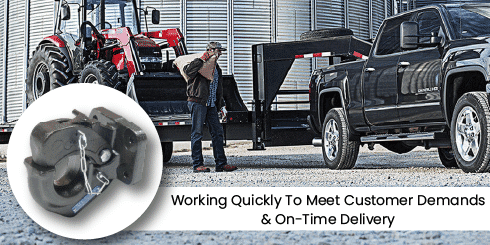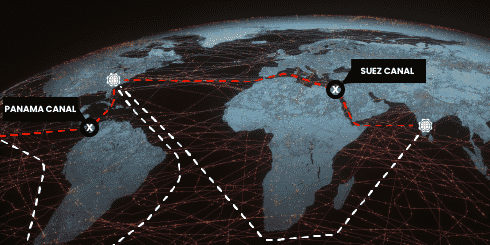Heavy Duty Pintle Hook Towing Hitch Case Study


How we delivered everything to a German world leader in truck and commercial vehicle components wanted from its supplier.
Pintle Hook hitch is a seemingly simple application but it carries the load of the trailer or often the vehicles. It bears a lot of static and dynamic load as items being towed move around at high speeds on highways or at low speeds on an off-road terrain.
A German leader in trucking components was struggling with supply as well as cost for these pintle hooks from a domestic manufacturer in its own country. They had been looking for an option for a couple of years – an offshore manufacturer with high-quality capabilities but one which can take responsibility for warranty, product liability and provide Just-In-Time inventory.
The product would be tested rigorously via a variety of mechanical tests in the lab as well as a 100% track test. The product also had exacting tolerances as well as porosity specifications.
The product is an assembly of precision machined parts, Grey iron cast parts with low porosity as well an off-the-shelf fastener.
The manufacturer decided to work with MES’s European office for design review, design-for-manufacturing as well as commercial exercises and technical reviews. The process took several months including a grueling supplier audit of MES / Euro Metrics’s important offshore supplier. The supplier also needed IATF as well as ISO14000 certification.
——————————————————
We don’t shy away from demanding customers or high expectations at MES. Not only do we thrive on these things, but we also hold ourselves to the highest possible standards – especially when it comes to safety, production, and service.
Our standards are lofty, yet simple: produce excellently and deliver exceptionally.
So, we were unphased (and, quite frankly, thrilled) when a top-ranked, German-based producer of commercial vehicle components approached us with what many would call a demanding task and a significant ask.
The Challenge
For this manufacturing leader, producing trusted, competitively-priced products for a worldwide customer base would mean engaging the right supplier. The right supplier would be highly experienced in manufacturing commercial parts, equipped to produce incomparable parts to exacting standards, and provide reasonable cost savings.
Finding the right supplier also meant finding a world-class team that could produce 6 variations on 1 part using the sand-casting process. And, because all 6 parts are crucial to commercial truck-to-trailer connection, safety considerations must be paramount.
MES Insights
Our approach to any and every project involves a fair amount of “think time.” Never ones to be order takers, we engage a select team of experts, including Six Sigma engineers, quality inspectors, and supply chain professionals, to think not just about what we’re producing, but how we can do it with more efficiency, effectiveness, and stability.
We conducted a discovery phase, taking a deep dive into our customer’s specifications. Not only did we review and collaborate with our customers on these critical specifications for the final tooling design, but we also conducted a thorough tooling kickoff before production began.
In order to ensure that we achieved the precision needed within the tolerances allowed to ensure the safety and reliability for 6 variations of iron parts, we developed a specific quality checkpoint methodology. These quality checkpoints would continuously support both quality assurance and quality control throughout the manufacturing process
In addition, our quality engineers conducted in-person reviews of the raw materials and employed our industry-leading quality management system for precision measuring and inspection.
The Solution
At the core of our safety-focused solution for providing the highest quality, most reliable parts were these 4 essential tests, each of which was performed no less than 4 times per casting batch.
- First-Pass Yield (FPY) Test – This procedure measures units that, when tested, pass on the first attempt before being checked in for repair. With FPY, if a unit fails enough times to enter repair, it is considered a failure. Typically, FPY is calculated for each process step.
- Hardness Test – This test helps determine the suitability of a material for a given application. It also ensures that the material can conform to a specification, standard, or particular condition, such as a heat treatment or thermal process when subjected to it.
- Tensile Test – This is a simple and widely used mechanical test that determines material properties and measures the force required to elongate a specimen to the breakpoint. Designers and quality managers use tensile testing to predict how a material or product will behave within its intended application.
- Crack Test – This test helps detect defects in nonporous materials or surfaces, including ceramics, plastics, iron, and other metals. To ensure fault-free repair, it is essential to detect even the most minuscule out-of-spec crack.
The Results
Six versions of sand-casted iron, heavy-duty towing hitches rolled off our production lines with such accuracy and precision that they satisfied our customer’s safety demands and exceeded their expectations. To date, MES has produced thousands of hook trailer hitches with safety locks and continues to deliver on the most important imperative – safety.
Services:
- Affordable Iron Sand Casting
- Value-Added Engineering
- Best-in-Class Quality Management
- Competitive Pricing
- Fast Tooling Lead Times
Find out how we can put these and other services to work for you. Contact Us today.




